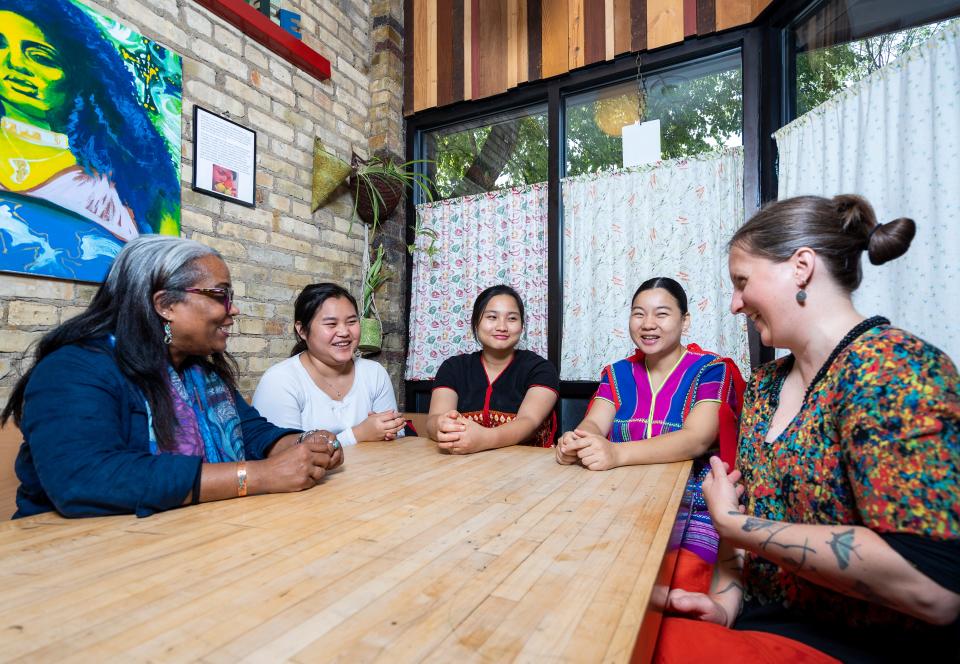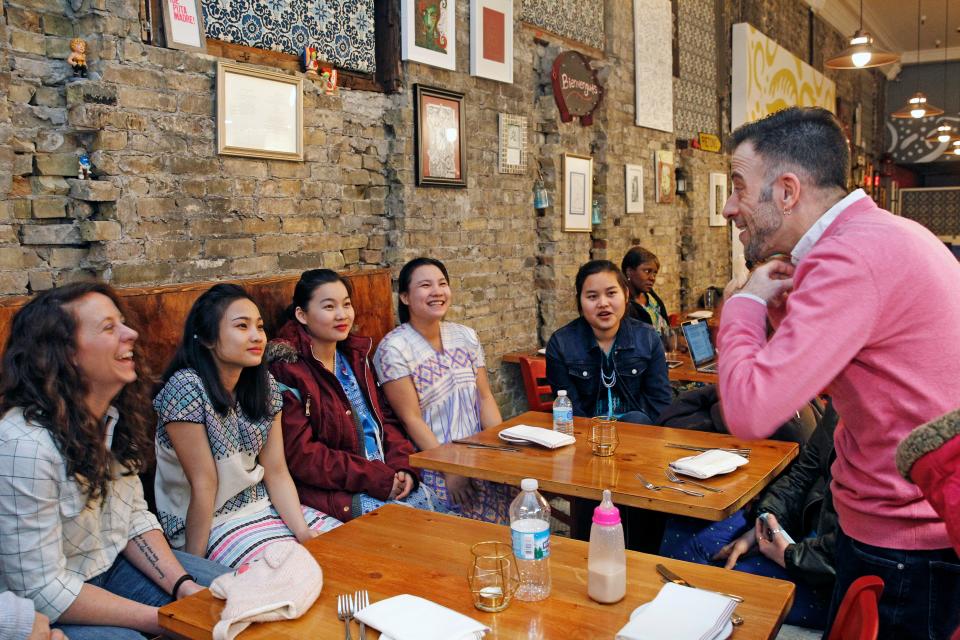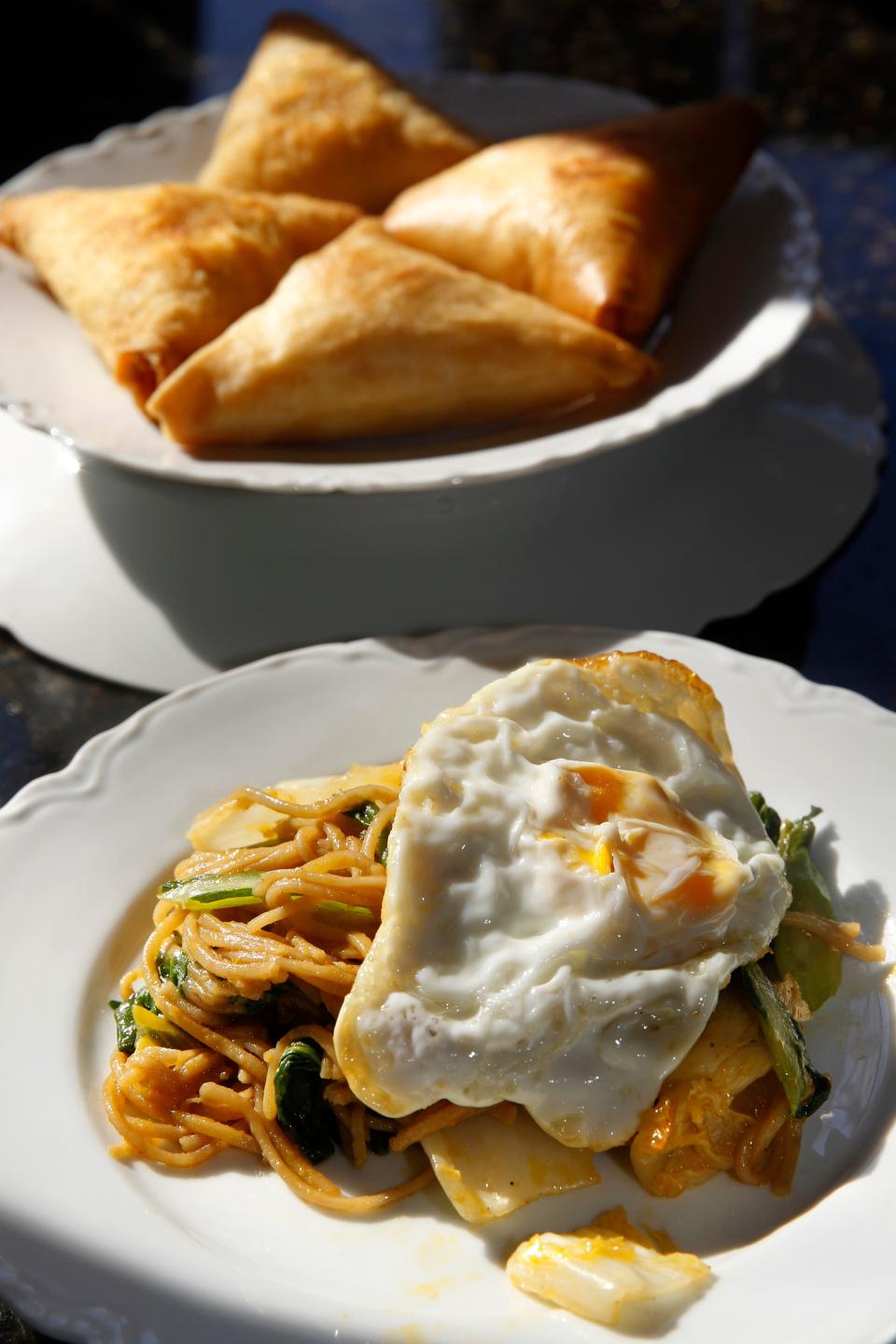Refugee chefs share stories, cuisine at Tables Across Borders dinner series
When Kai Gardner Mishlove was volunteering with refugee families at the Aurora Walker’s Point Community Clinic, a simple act of kindness sparked an idea that would change not only her path in life, but also the path of the families’ lives who extended her such graces.
“When I arrived at the family’s home, I had an agenda for the day that we needed to follow. But the dad stopped me and said, ‘No, no. No business will be conducted until you sit down and have a cup of coffee with us.,'” Gardner Mishlove said.
She said the experience of going into refugee families’ homes, where she rarely left without homemade food or a full meal, opened her eyes to a new way to build bridges across communities.
“In one week of home visits, I was essentially traveling the globe, learning the families’ stories and eating their incredible food,” Gardner Mishlove said. “It reminded me of my own grandmother cooking for the neighborhood — her kitchen was always open.”

Gardner Mishlove set out to build a program aimed at creating entrepreneurial opportunities to support refugee families while raising awareness of the positive impact of immigration. At the center of it would be the refugee families, who would cook their cultures’ cuisine and share it with their communities at local restaurants.
Gardner Mishlove shared her idea with local chef Saehee Chang, who connected her with three local restaurant owners — Gregory León of Amilinda, Caitlin Cullen of The Tandem and Christie Melby-Gibbons of Tricklebee Cafe — who she thought might be interested in hosting the dinners cooked by refugee families.
Without having met them previously, Gardner Mishlove asked if they’d want to participate. All three replied with an emphatic “yes” within minutes. Tables Across Borders was born.
"Offering our space to talented chefs who need a commercial kitchen but don’t have access to one is a true delight for us," Melby-Gibbons said. "Our aim is to offer hospitality in as many ways as possible, and being able to open up our kitchen so that these neighbors can create delectable meals from their cultures is a true honor."
“One of my core ideas when opening Amilinda was to use the space not only for doing what I love — cooking and making people forget about troubles for an hour and a half — but to also make the community a better place,” León said about his eagerness to join the program. “This gives us an opportunity to do that, but we’ve learned so much just being in the kitchen with the families.”
Since the first dinner in February 2019, Tables Across Borders has shared the cuisines of the Rohingya, Karen, Serbian, Afghani, Ethiopian, Eritrean, Congolese, Syrian, Somali, Burmese and Ukrainian people at more than 25 dinners.
One hundred percent of the ticket sales go directly to the refugees cooking the dinners, and everyone working the event does so on a volunteer basis. Gratuity and alcohol sales are not included, but León said sales from the bar essentially cover the cost of the electricity for the night.
Funds for the cost of ingredients are provided by sponsors, including the University of Wisconsin-Milwaukee Cultures & Communities program, Jewish Social Services of Madison, Lynden Sculpture Garden and the Hanan Refugee Relief. Volunteers from these organizations help during the dinners, as well.
The current series kicked off Feb. 19 with a dinner at Amilinda, 315 E. Wisconsin Ave., featuring Burmese cuisine. Amilinda also will host the next dinner, featuring Syrian cuisine, on March 4.
Tricklebee Cafe, a pay-what-you-can restaurant at 4424 W. North Ave. on Milwaukee’s northwest side, will host dinners on March 18 (Eritrean cuisine) and May 20 (Rohingya cuisine). Both dinners at Tricklebee Cafe will be fully vegan.

Food and fellowship bring cultures together
Before each dinner, Gardner Mishlove shares a chef profile on the Tables Across Borders Facebook page, including the chef’s family's story, when they arrived in the United States, what their aspirations are, what their motivations for cooking are, and their favorite foods, including favorites from their own country as well as the U.S.
“It’s a way to humanize who the chef is before guests meet them at the dinner,” Gardner Mishlove said.
The night of the dinners, the chef is always front and center, and given an opportunity to share their story, how to keep in touch after the dinner, and a little about the food they’ll be serving.
The chefs will sometimes run their menu by the restaurant owners, but the dishes they choose to serve and the preparation is fully their creation.
“I tell them, ‘Don’t tone your food down. Cook whatever you would cook for your own family,’” Gardner Mishlove said. “Trust me, people will like it.”
“We come in and basically just turn on the oven and fryer and just sit back and let them do their thing,” León said. “They do everything. They decide the menu, do all the cooking, everything.”
Though many of the refugee families may not have extensive experience in professional kitchens, Melby-Gibbins said cooking for large amounts of people comes naturally.
"These refugee families understand how to feast together. It’s very easy for them to make large quantities of food because they’re used to cooking for and eating with all of their family members," she said. "Preparing the feast together is just as important as serving and enjoying the feast."

Dinners are served buffet-style, with five to six different dishes served, including a dessert. Seating is open throughout the hosting restaurant. Guests may be seated next to or across from someone they’d never have met otherwise, but everyone is there for the same purpose: to experience and uplift the culture of the families who are there to cook for them.
“We have a really diverse group of folks who come to these dinners. Maybe there’s someone coming from the south side, another from Waukesha and another from Sherman Park. They don’t know each other, but they become friends and end up coming to all the dinners,” Gardner Mishlove said.
That’s one of the highlights of the program for Gardner Mishlove. “I love to watch the people meet and come together," she said. "It’s about the joy of experiencing the food and the joy on the refugee chefs’ faces, realizing that people who are not from their community appreciate their food and its authenticity.”
León, a three-time James Beard Award nominee, said the experience of hosting the chefs is rewarding on multiple levels.
“Just seeing and learning how people cook in different cultures and countries is so eye-opening. I’ve learned so much about cooking from the different techniques they use,” he said. “When the time comes for Amilinda to ride into the sunset, this will be one of the programs I’ve been involved in that I’ll look back to with incredible fondness.”
Aside from sending refugees home with the proceeds from the night’s event, Tables Across Borders has served as an incubator for the families’ food businesses, too. Gardner Mishlove said some of the chefs have gone on to cook for catering events, including the Lynden Sculpture Garden’s World Refugee Day.
Gardner Mishlove, who now lives in Madison and is executive director of the Jewish Social Services of Madison, has expanded the program to her new hometown, recently hosting Afghani dinners at Morris Ramen and Temple Beth El. A full Madison dinner series is coming soon.
“People don't realize just how multicultural Madison and Milwaukee are. Sometimes we're in communities that are segregated from one another, and we may not know there's amazing food and people right under our noses,” she said. “This is a way that we can see how similar we are to each other, that we're really more similar than separate.”
How to dine at Table Across Borders
There are three remaining dates for the current Tables Across Borders Milwaukee series.
March 4: Syrian cuisine by Chef Tahani, hosted at Amilinda
March 18: Eritrean cuisine by Chef Fikadu, hosted at Tricklebee Cafe
May 20: Rohingya cuisine by Chef Hasina and Chef Salim, hosted at Tricklebee Cafe
Tickets are on sale now ($70 per person) for the March 4 dinner at Amilinda and the March 18 dinner at Tricklebee Cafe. Visit exploretock.com/amilinda to learn more and purchase tickets.
To learn more about the chefs and stay up-to-date about future Tables Across Borders events, follow Tables Across Borders on Facebook.
Rachel Bernhard joined the Journal Sentinel as dining critic in June 2023. She’s been busy exploring the Milwaukee area food scene to share her favorite finds with readers along the way. Like all Journal Sentinel reporters, she buys all meals, accepts no gifts and is independent of all establishments she covers.
What should she cover next? Contact her at rseis@gannett.com. Follow her on Twitter at @rachelbernhard or on Instagram at @rach.eats.mke.
This article originally appeared on Milwaukee Journal Sentinel: Refugee chefs share stories, cuisine at 2024 Tables Across Borders dinners

